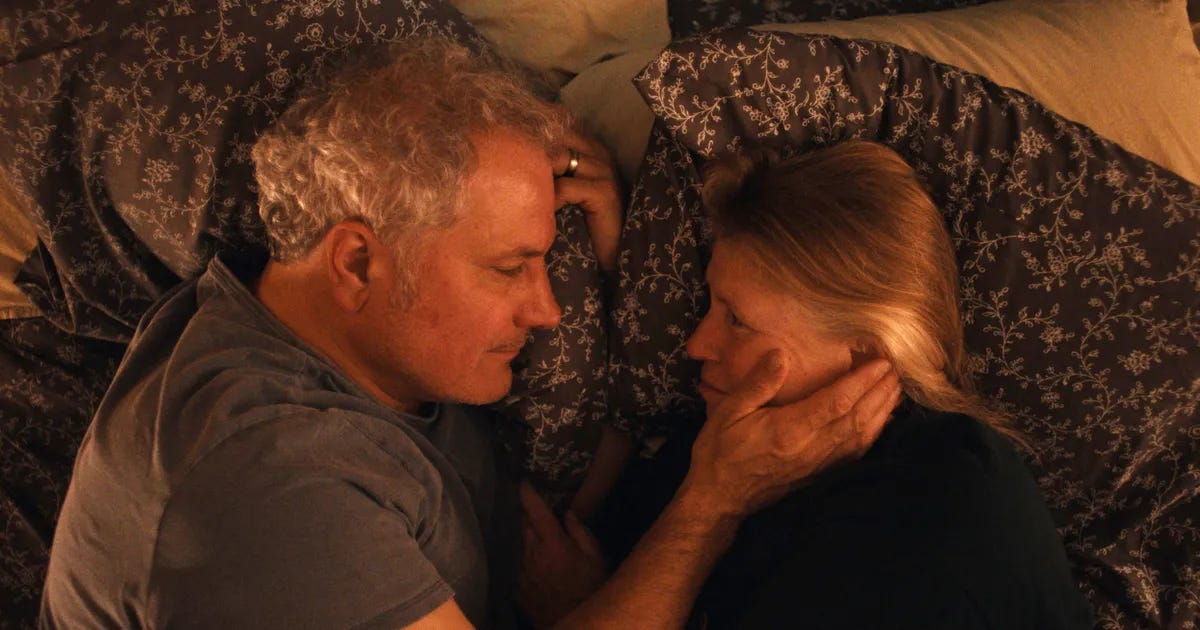In Ghostlight, directors Kelly O’Sullivan and Alex Thompson guide us into a story that, without resorting to shock tactics, delivers a stunning, deeply personal experience. This quietly remarkable film tells a story of grief, healing, and the cathartic power of art, unfolding with a grace and raw honesty that resonate long after.
The film’s opening, where art is depicted as something beyond imitation—a vessel for the indescribable parts of human experience—sets the tone. Here, art isn’t just a reflection; it’s a lifeline, a space for healing. Dan (Keith Kupferer), a construction worker weighed down by life’s burdens, represents this idea fully. The fatigue in his expression speaks volumes, even before we learn of the heavy grief his family carries. His wife, Sharon (Kupferer’s real-life spouse, Tara Mallen), and their daughter Daisy (Kupferer’s real-life daughter Katherine Mallen Kupferer) stand alongside him, bound yet strained by an overwhelming sadness they cannot escape.
At first, the cause of their pain is shrouded in mystery, alluded to in quiet moments—a flinch here, an eruption there. But the depth of their sorrow seeps through each scene, underscoring the frustration and tension that permeates their family’s life. As Dan and Sharon grapple with Daisy’s rebellious behavior, their attempts to communicate break down, each one struggling to cope in isolation. These fractured connections reveal the agonizing silence between them—a silence so profound that even words cannot bridge it.
When a meeting with Daisy’s school counselor exposes just how strained the family dynamic has become, Dan’s rigid control over his emotions begins to crack. Yet, he lacks the tools to express his pain, and it is only when he crosses paths with Rita (Dolly De Leon) that a flicker of possibility appears. Rita, a local theater director, invites him into her community theater group. This unsuspecting encounter opens a door to something he had never considered: an escape, a place to feel freely, and an outlet for emotions he’s been forced to bottle up.
Dan’s first encounter with the troupe is tentative, and his reluctance is almost palpable. He enters their world like an outsider, unable to grasp the language of theater yet curiously drawn to it. The juxtaposition of Dan’s rough, gruff nature with the troupe’s openness provides humor but also a fascinating contrast, underscoring the depth of his longing for release. Here, surrounded by eccentric, passionate individuals who embrace art’s liberating power, Dan slowly starts to drop his guard. Each rehearsal, each line of Shakespeare that he stumbles through, allows him to peel away the layers of grief and anger he’s carried for too long.
Kupferer’s portrayal of Dan captures this transformation with stunning subtlety, grounding his journey in an everyman’s struggle. He wears his grief with quiet restraint, and as his armor begins to fall away, we witness a rare vulnerability that makes his character achingly relatable. The scenes with Rita bring out a poignant contrast, showing how Dan’s tentative steps into this new world of self-expression help him confront the pain he cannot voice elsewhere. His journey becomes more than a personal exploration; it’s an act of survival, a step toward reclaiming himself.
The familial dynamics in Ghostlight resonate deeply, enhanced by the authenticity of the real-life connections between the actors. Tara Mallen’s Sharon embodies resilience with a gentle but unyielding strength. Her quiet endurance anchors the family, even as she too struggles to find space for her grief. Katherine’s portrayal of Daisy is raw and mesmerizing, capturing the tumultuous storm of a teenager wrestling with her own suffering. Each family member’s journey is marked by distinct, heartbreaking beauty, a reflection of the unspoken emotional toll that binds them together even as it threatens to tear them apart.
In its climactic scenes, Ghostlight moves beyond mere storytelling to something almost sacred. Dan’s breakthrough moment—where he finally surrenders to his emotions on stage—feels like a revelation. As he shares his pain with his fellow actors, the barrier between his real and performative lives dissolves. What emerges is a raw expression of humanity, a catharsis that draws him closer to the very heart of what he has been running from. The support he finds within this small community of actors becomes a life raft, showing how even strangers can become anchors in our darkest times.
Ghostlight is a powerful ode to art, family, and the unexpected places where we find solace. Through the lens of grief and healing, it illuminates the grace that lies in vulnerability and the quiet bravery required to keep moving forward. This is no mere tale of redemption but a story that transcends its modest setting, inviting viewers to reflect on art’s capacity to transform and sustain us. In Ghostlight, the healing power of storytelling is not just observed; it is felt deeply, and through its journey, we are reminded of the beauty that lives in every scar, every stumble, and every brave, halting step forward.
Received a FYC screener thanks to IFC Films




